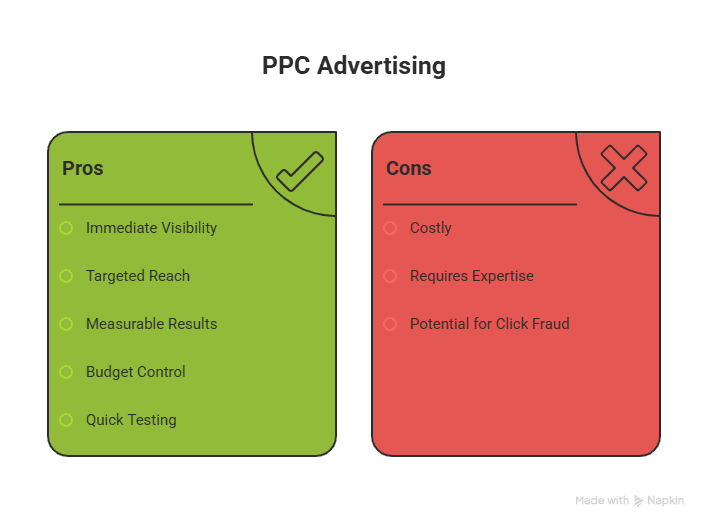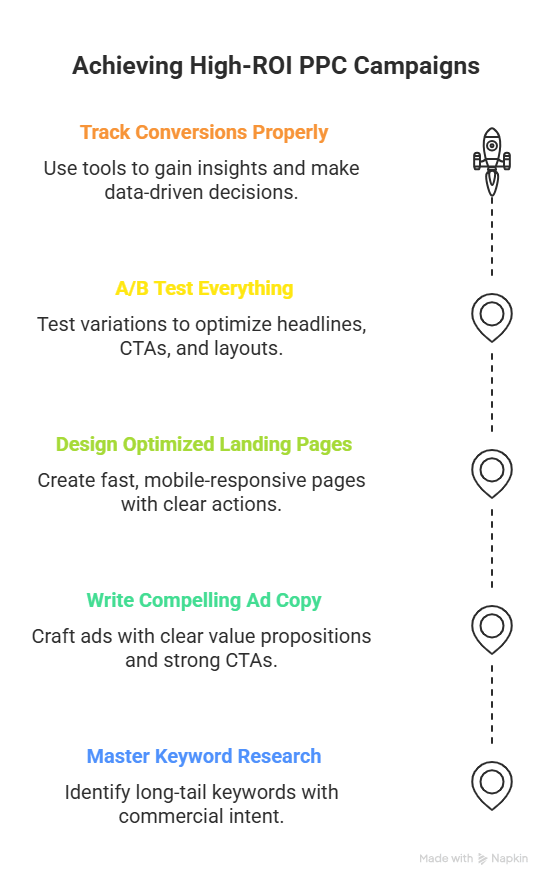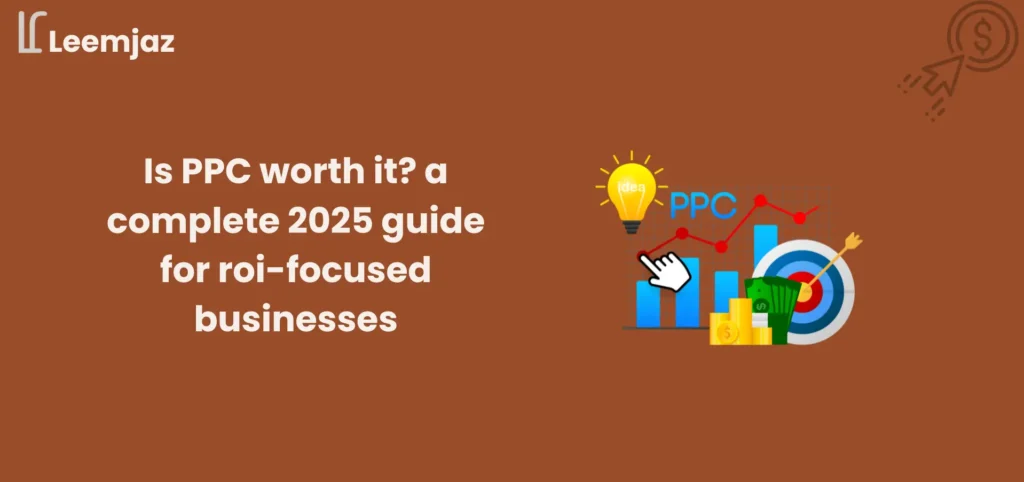Introduction
Pay Per Click (PPC) advertising promises instant visibility, measurable traffic, and the ability to target your ideal customer with precision. But with increasing competition and rising ad costs, the question many businesses are asking is simple: Is PPC really worth it?
The answer is not as black and white as some marketers might claim.
PPC can be a powerful tool to drive growth if it is done strategically. For some businesses, it delivers a strong return on investment and scales fast. For others, it drains the budget without results. The truth is, whether PPC is “worth it” depends entirely on your goals, industry, budget, and how you run your campaigns.
In this guide from Leemjaz, we will break it all down:
- What PPC actually is and how it works
- The real advantages and disadvantages without the fluff
- Common mistakes that kill ROI
- When PPC makes sense (and when it does not)
- Real-world scenarios, expert strategies, and tips you can apply today
What Is Pay Per Click (PPC) Advertising?
At its core, Pay Per Click is a digital advertising model where you pay a fee each time someone clicks on your ad. You’re not paying for impressions or views; you are paying for action.
How It Works
You create an ad and bid on specific keywords relevant to your business. When a user types in that keyword on platforms like Google, Bing, or YouTube, your ad may show up at the top of the results. If the user clicks it, you pay.
Platforms Commonly Used for PPC
- Google Ads (Search & Display)
- Facebook & Instagram Ads
- LinkedIn Ads
- YouTube Ads
- Bing Ads
Each platform has its own ad formats, targeting options, and costs, but the goal remains the same: drive targeted traffic that converts.
The Advantages of PPC Advertising

Let’s look at why PPC works so well for many brands, especially when done right.
1. Immediate Visibility
Unlike SEO, which can take months, PPC can launch your business to the top of Google literally overnight. This is invaluable for:
- New product launches
- Limited-time offers
- Competitive industries
2. Hyper-Targeted Audience Reach
PPC platforms allow laser-focused targeting:
- Location, gender, age, interests
- Custom audiences (like website visitors)
- Behavior-based targeting
This means your ads are shown only to the people most likely to convert.
3. Fully Measurable and Trackable
Every click, impression, conversion, and cost is tracked in real time. You always know what is working and what is wasting your money.
4. Budget Control
You can set daily, weekly, or lifetime budgets. Pause anytime. Scale up or down as needed. This gives you total flexibility, even on small budgets.
5. Quick Testing Opportunities
PPC is great for testing headlines, offers, or landing pages. A/B testing is fast and provides real data, helping improve overall marketing performance.
The Downsides of PPC Advertising
It is not all sunshine and conversions. PPC comes with its own risks and costs. Here is where many campaigns fall flat:
1. It Can Get Expensive Fast
If you are in a competitive industry (law, finance, SaaS), cost per click (CPC) can range from $10 to over $100. Without the right strategy, your budget can burn quickly with little to show.
2. Temporary Results
Turn off your ads and your traffic disappears. Unlike SEO, PPC does not build long-term value unless constantly funded.
3. Click Fraud
Automated bots and even competitors can click your ads, costing you money without generating real leads. While ad platforms have systems to detect this, it is not foolproof.
4. Steep Learning Curve
Success in PPC requires knowledge of:
- Keyword strategy
- Landing page optimization
- Ad copywriting
- Audience segmentation
- Analytics and tracking setup
Without expertise, DIY campaigns often underperform.
PPC vs SEO: Which One Is Better?
Let us compare PPC to SEO in simple terms.
| Feature | PPC | SEO |
| Cost | Ongoing ad spend | Upfront investment in content/optimization |
| Time to Results | Immediate | 3–6 months |
| Sustainability | Ends when you stop ads | Long-lasting traffic |
| Click Trust | Ads are often skipped | Organic results seen as more trustworthy |
| Best For | Fast campaigns, promotions | Building long-term authority |
Our take: Use both. PPC gives you speed. SEO gives you sustainability. They complement each other when executed strategically.
When Is PPC Worth It?
PPC is worth it if your business has:
- A clear conversion funnel
- Profitable lifetime customer value (LTV)
- The ability to test, analyze, and refine campaigns regularly
Great Use Cases for PPC
- Ecommerce websites with tight product margins and retargeting potential
- Local service businesses (plumbers, dentists, attorneys) looking for leads
- New SaaS startups needing fast growth
- Limited-time campaigns like holiday offers or product launches
- Event promotion or time-sensitive registrations
When PPC May Not Be Worth It
- Businesses without a clear sales funnel or follow-up process
- Small budgets with no room for testing
- Industries with high CPCs but low conversion rates
- Relying solely on PPC with no long-term organic strategy
Real-World Case Studies
Case Study: E-commerce Brand Scales 3x ROI
An online store selling skincare products used Google Ads and Facebook Retargeting. After 30 days of testing and optimizing:
- 230% ROI
- 1.8% conversion rate from cold traffic
- 4.5% conversion from retargeting
Case Study: Local Dental Practice
Using geo-targeted Google Ads for “emergency dentist near me,” this local clinic:
- Booked 37 new patients in one month
- Reduced cost per lead by 42% after optimizing landing pages
Best Practices for High-ROI PPC Campaigns

If you decide to invest in PPC, here is how to do it right:
1. Master Keyword Research
Use tools like:
- Google Keyword Planner
- Ahrefs
- SEMrush
Focus on long-tail, commercial intent keywords.
2. Write Compelling Ad Copy
- Clear value proposition
- Strong CTA (Call To Action)
- Relevant extensions (callouts, sitelinks, reviews)
3. Design Optimized Landing Pages
- Fast loading (under 3 seconds)
- Mobile responsive
- Consistent message from ad to page
- One clear action: buy, sign up, call, etc.
4. A/B Test Everything
Test variations of:
- Headlines
- CTA buttons
- Landing page layouts
Track conversions, not just clicks.
5. Track Conversions Properly
Install Google Analytics 4 (GA4), Meta Pixel, and use Google Tag Manager. Know exactly what is working.
Integrating PPC With Other Strategies
PPC is most effective when integrated with:
- SEO: Use PPC to test what keywords convert best, then build SEO content around them.
- Email Marketing: Capture leads from PPC and nurture them via email.
- Retargeting Ads: Follow up with users who visited but did not convert.
- Content Marketing: Promote valuable blog posts to warm up cold audiences.
Why Choose Leemjaz PPC Services?
At Leemjaz, we understand that effective PPC is more than just running ads. It’s about strategy, execution, and optimization. Here is what our PPC services include:
Full-Service PPC Management
- Google Ads (Search, Display, Shopping)
- Facebook & Tiktok Ads
- LinkedIn & YouTube Campaigns
Conversion Optimization
- Landing page design & testing
- Conversion tracking setup
- Funnel development
Targeting & Strategy
- In-depth keyword research
- Audience segmentation
- Competitor analysis
Analytics & Reporting
- Real-time dashboards
- Monthly performance reviews
- Transparent ROI tracking
Whether you’re a startup or a scaling enterprise, our mission is to help you generate leads, increase sales, and maximize your ad spend.
Let’s make your budget work smarter. Explore our PPC services or schedule a free consultation.
Conclusion: Is PPC Worth It?
Here is the honest answer:
Yes, PPC is worth it if you have a strategy, track your results, and use it to accelerate growth or conversions.
No, it is not worth it if you’re guessing, rushing, or copying others without data.
Think of PPC as a scalpel, not a hammer. It is a precision tool, and when handled correctly, it delivers fast, powerful results. But it requires planning, skill, and constant refinement.
If you’re unsure how to approach it or want to avoid burning your budget, consider partnering with experts who have been there. That is what we do at Leemjaz.com.
FAQs
What is a good ROI for PPC?
Most businesses aim for 2x to 4x ROI. However, acceptable ROI depends on your industry, sales process, and customer lifetime value.
How much should I spend on PPC as a beginner?
Start small—$500 to $1000 per month is enough for testing. Scale only when you find what works.
Can PPC help my SEO?
Indirectly, yes. PPC can drive traffic, generate engagement, and reveal which keywords convert, helping inform your SEO content strategy.
Is PPC better than Facebook or Instagram ads?
It depends. Google Ads captures intent (users searching), while Facebook Ads are better for targeting interests and behavior. Many businesses use both.
How soon will I see results with PPC?
You can see traffic immediately, but optimization takes 2 to 4 weeks. Expect meaningful results in 30 to 90 days with consistent tweaking.

Worth reading
Your point of view caught my eye and was very interesting. Thanks. I have a question for you.